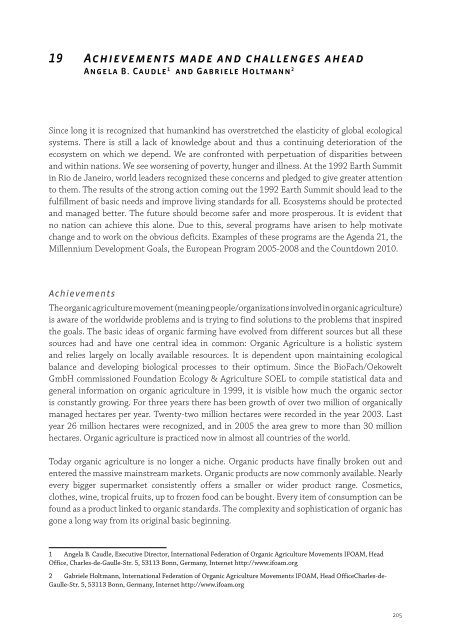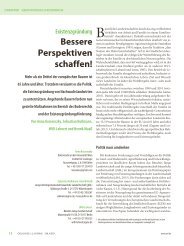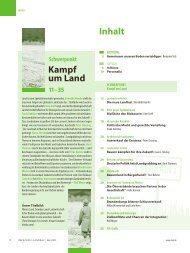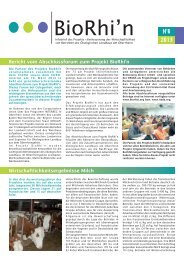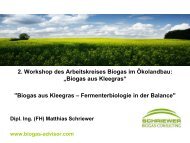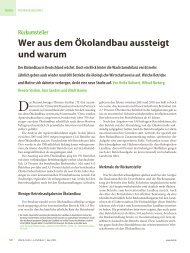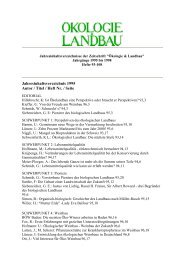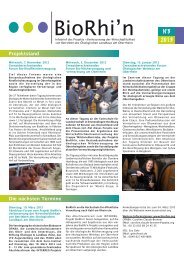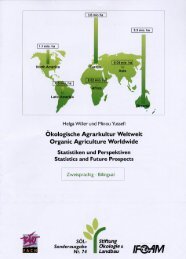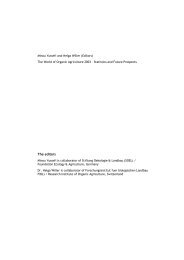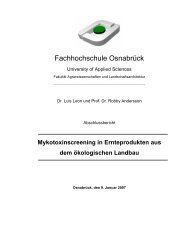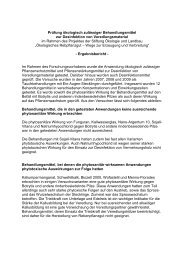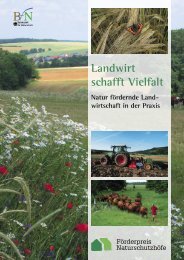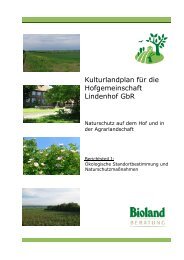the world of organic agriculture - Organic Eprints
the world of organic agriculture - Organic Eprints
the world of organic agriculture - Organic Eprints
Create successful ePaper yourself
Turn your PDF publications into a flip-book with our unique Google optimized e-Paper software.
19 Achievements made and challenges ahead<br />
Angela B. Caudle 1 and Gabriele Holtmann 2<br />
Since long it is recognized that humankind has overstretched <strong>the</strong> elasticity <strong>of</strong> global ecological<br />
systems. There is still a lack <strong>of</strong> knowledge about and thus a continuing deterioration <strong>of</strong> <strong>the</strong><br />
ecosystem on which we depend. We are confronted with perpetuation <strong>of</strong> disparities between<br />
and within nations. We see worsening <strong>of</strong> poverty, hunger and illness. At <strong>the</strong> 1992 Earth Summit<br />
in Rio de Janeiro, <strong>world</strong> leaders recognized <strong>the</strong>se concerns and pledged to give greater attention<br />
to <strong>the</strong>m. The results <strong>of</strong> <strong>the</strong> strong action coming out <strong>the</strong> 1992 Earth Summit should lead to <strong>the</strong><br />
fulfillment <strong>of</strong> basic needs and improve living standards for all. Ecosystems should be protected<br />
and managed better. The future should become safer and more prosperous. It is evident that<br />
no nation can achieve this alone. Due to this, several programs have arisen to help motivate<br />
change and to work on <strong>the</strong> obvious deficits. Examples <strong>of</strong> <strong>the</strong>se programs are <strong>the</strong> Agenda 21, <strong>the</strong><br />
Millennium Development Goals, <strong>the</strong> European Program 2005-2008 and <strong>the</strong> Countdown 2010.<br />
Achievements<br />
The <strong>organic</strong> <strong>agriculture</strong> movement (meaning people/organizations involved in <strong>organic</strong> <strong>agriculture</strong>)<br />
is aware <strong>of</strong> <strong>the</strong> <strong>world</strong>wide problems and is trying to find solutions to <strong>the</strong> problems that inspired<br />
<strong>the</strong> goals. The basic ideas <strong>of</strong> <strong>organic</strong> farming have evolved from different sources but all <strong>the</strong>se<br />
sources had and have one central idea in common: <strong>Organic</strong> Agriculture is a holistic system<br />
and relies largely on locally available resources. It is dependent upon maintaining ecological<br />
balance and developing biological processes to <strong>the</strong>ir optimum. Since <strong>the</strong> BioFach/Oekowelt<br />
GmbH commissioned Foundation Ecology & Agriculture SOEL to compile statistical data and<br />
general information on <strong>organic</strong> <strong>agriculture</strong> in 1999, it is visible how much <strong>the</strong> <strong>organic</strong> sector<br />
is constantly growing. For three years <strong>the</strong>re has been growth <strong>of</strong> over two million <strong>of</strong> <strong>organic</strong>ally<br />
managed hectares per year. Twenty-two million hectares were recorded in <strong>the</strong> year 2003. Last<br />
year 26 million hectares were recognized, and in 2005 <strong>the</strong> area grew to more than 30 million<br />
hectares. <strong>Organic</strong> <strong>agriculture</strong> is practiced now in almost all countries <strong>of</strong> <strong>the</strong> <strong>world</strong>.<br />
Today <strong>organic</strong> <strong>agriculture</strong> is no longer a niche. <strong>Organic</strong> products have finally broken out and<br />
entered <strong>the</strong> massive mainstream markets. <strong>Organic</strong> products are now commonly available. Nearly<br />
every bigger supermarket consistently <strong>of</strong>fers a smaller or wider product range. Cosmetics,<br />
clo<strong>the</strong>s, wine, tropical fruits, up to frozen food can be bought. Every item <strong>of</strong> consumption can be<br />
found as a product linked to <strong>organic</strong> standards. The complexity and sophistication <strong>of</strong> <strong>organic</strong> has<br />
gone a long way from its original basic beginning.<br />
1 Angela B. Caudle, Executive Director, International Federation <strong>of</strong> <strong>Organic</strong> Agriculture Movements IFOAM, Head<br />
Office, Charles-de-Gaulle-Str. 5, 53113 Bonn, Germany, Internet http://www.ifoam.org<br />
2 Gabriele Holtmann, International Federation <strong>of</strong> <strong>Organic</strong> Agriculture Movements IFOAM, Head OfficeCharles-de-<br />
Gaulle-Str. 5, 53113 Bonn, Germany, Internet http://www.ifoam.org<br />
205


